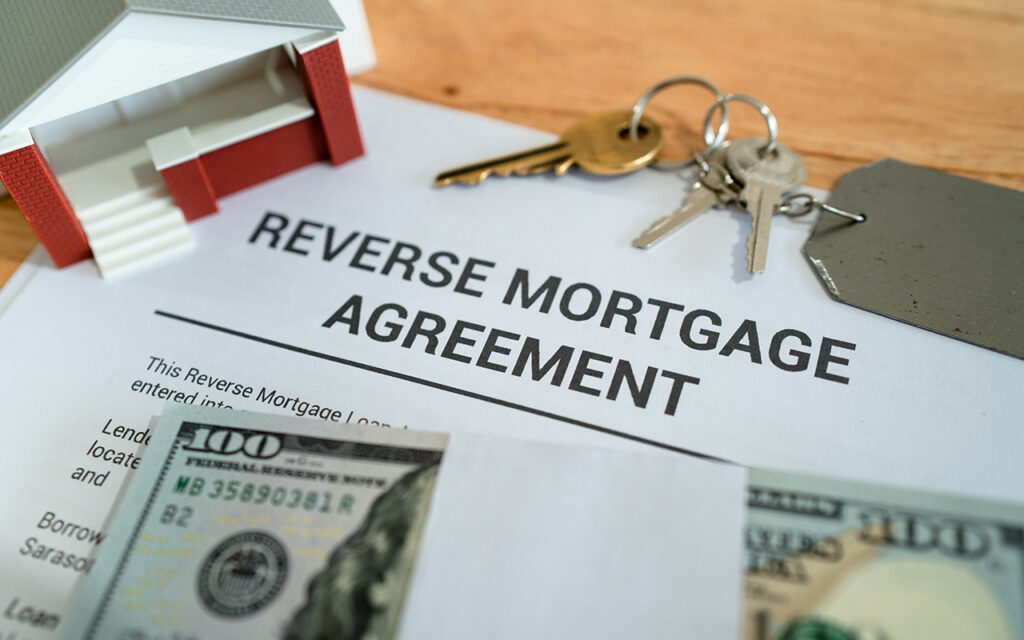For years, reverse mortgages carried a reputation as a last-resort option—something only the desperate would consider. But in 2025, with rising living costs, longer retirements, and a growing need for income flexibility, more older Americans are giving reverse mortgages a second look.
So, is tapping your home equity a financial lifeline—or a trap? The answer depends on your needs, your goals, and how well you understand the fine print. This article breaks down what a reverse mortgage is, how the rules have changed in recent years, who should (and shouldn’t) consider one, and how to avoid the scams still lurking in the market.
What Is a Reverse Mortgage, Really?

A reverse mortgage is a type of loan available to homeowners aged 62 and older that allows them to convert part of their home equity into tax-free cash—without selling the home or making monthly mortgage payments.
Unlike a traditional mortgage where you make payments to a lender, a reverse mortgage pays you. You retain ownership of your home, but the lender gains a growing claim on your equity. The loan is repaid when you move out, sell the house, or pass away.
The most common type is a Home Equity Conversion Mortgage (HECM), which is federally insured and regulated by the U.S. Department of Housing and Urban Development (HUD). There are also proprietary (private) reverse mortgages for higher-value homes, but these typically come with fewer protections.
What’s Changed in 2025?
Reverse mortgages today are not the same products that drew criticism in the past. A series of rule changes over the past decade—especially after the 2008 financial crisis—have added significant consumer safeguards.

Some of the most important updates as of 2025 include:
- Stricter borrower qualification standards, including financial assessments to ensure homeowners can cover taxes, insurance, and basic upkeep.
- Mandatory counseling by a HUD-approved advisor before loan approval.
- New annual disclosure requirements, helping borrowers track how their loan balance is growing.
- Non-borrowing spouse protections, allowing eligible spouses to stay in the home after the borrower’s death without facing immediate foreclosure.
These changes aim to make reverse mortgages safer and easier to understand—especially for older adults living on fixed incomes.
How Does a Reverse Mortgage Work?
To qualify for a reverse mortgage, you must be at least 62 years old and either own your home outright or have a significant amount of equity. The amount you can borrow depends on your age, current interest rates, your home’s value, and your loan type.

The money you receive can be taken as a lump sum, monthly payments, a line of credit, or a combination. You do not have to pay taxes on the funds, and you are not required to make loan payments as long as you live in the home and meet the loan conditions.
However, the loan balance increases over time due to interest and fees. When the loan ends—because you’ve moved, sold the house, or died—your heirs must repay the loan, usually by selling the home. If the home sells for less than the loan amount, federal mortgage insurance covers the difference (for HECM loans).
Who Might Benefit from a Reverse Mortgage?

Reverse mortgages can be a smart strategy for certain retirees, especially those who are:
- House-rich but cash-poor. If most of your net worth is tied up in your home and you need additional income for retirement expenses, a reverse mortgage can unlock that value without requiring you to move.
- Planning to age in place. If you intend to remain in your home for the foreseeable future, a reverse mortgage can help cover property taxes, medical expenses, or home renovations.
- Interested in a flexible financial tool. A reverse mortgage line of credit grows over time and can be tapped when needed, making it a useful backup source of income or emergency funds.
- Single or have no heirs who need the house. If you don’t plan to pass the home down, a reverse mortgage might allow you to use the asset while you’re alive, without worrying about leaving it behind.
When Is a Reverse Mortgage Not a Good Idea?

A reverse mortgage may not make sense if you plan to move within a few years, as the upfront costs can be significant. Origination fees, closing costs, and mortgage insurance premiums can total thousands of dollars and eat into your equity if the loan is short-term.
It’s also not ideal for those who struggle to maintain their home or pay property taxes and insurance. Failure to meet these obligations can put the loan—and your home—at risk.
Finally, if you want to leave your home to your children, a reverse mortgage adds complexity. While heirs can keep the house by repaying the loan, doing so can be financially challenging.
Avoiding Scams and Predatory Lending
Despite stricter regulations, reverse mortgage scams still exist—and older adults remain frequent targets. Be wary of:
- Anyone pressuring you to take a loan for investment purposes. This is a red flag, and often illegal.
- Contractors or salespeople who suggest a reverse mortgage to finance home repairs. Never borrow money without reviewing terms with a financial advisor or counselor.
- Lenders charging excessive fees or offering misleading claims. Always compare quotes and stick to HUD-approved lenders.
You can check the legitimacy of any lender through the HUD website, and you should insist on independent reverse mortgage counseling before proceeding.
The Bottom Line: Scam or Smart Strategy?

A reverse mortgage is not inherently good or bad. It’s a tool—and like any financial product, it must be used wisely and understood fully.
For some retirees, it can offer essential cash flow, peace of mind, and the ability to stay in a beloved home. For others, especially those with plans to move, heirs to consider, or limited equity, the downsides may outweigh the benefits.
What matters most is getting personalized advice from a licensed financial planner or HUD-certified counselor. If a reverse mortgage fits into your broader retirement strategy—not as a quick fix, but as a planned move—it can be a smart and safe option in 2025.
Key Takeaways:
- Reverse mortgages have improved with new consumer protections, but they still come with risks.
- They are best for older homeowners who want to stay in their home long-term and need supplemental income.
- Upfront costs can be high, and the impact on heirs must be considered.
- Always consult a HUD-approved counselor before signing anything.
Thinking about a reverse mortgage? Start by researching reputable lenders, and schedule a session with a certified counselor to understand your options. In the right hands and the right situation, this tool could help turn your house into more than just a home—it could be the cornerstone of your retirement security.